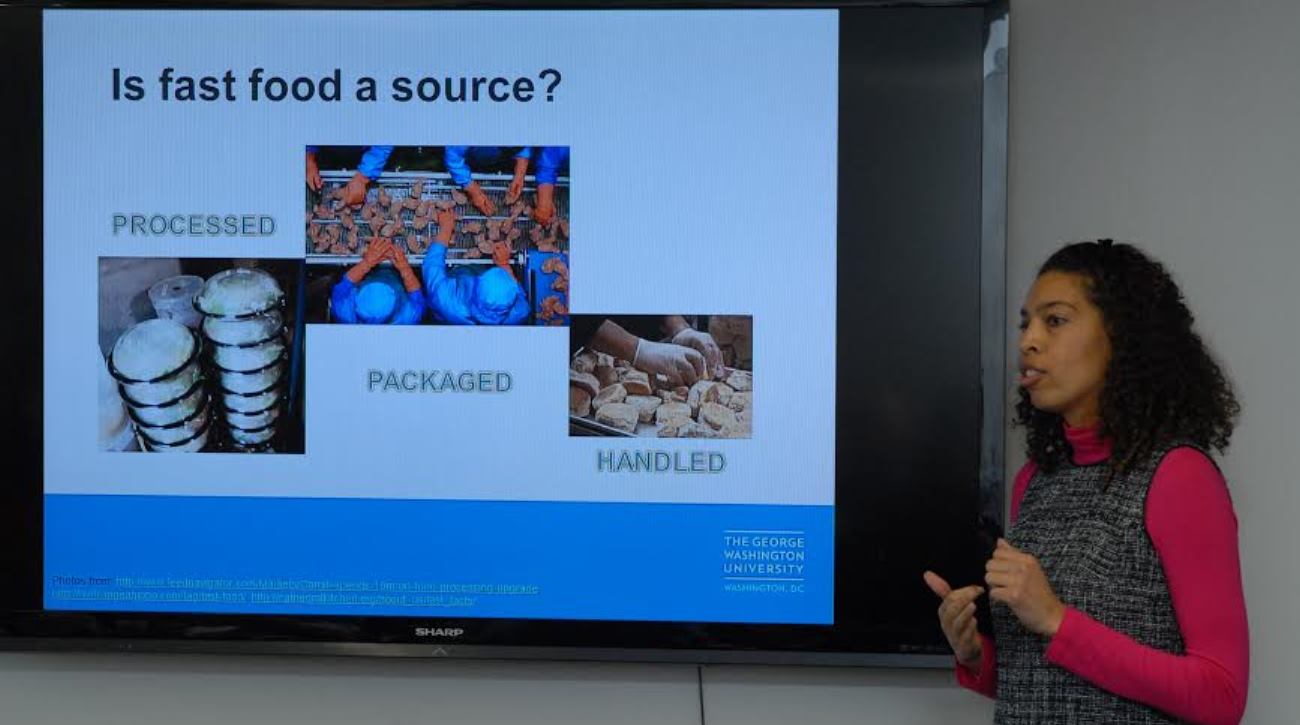Ten Environmental and Occupational Health students, faculty, and staff were linked to five of the more than 260 posters presented at GW’s Health and Medicine Research Day. The research conducted by a recent alumna while she was a student here earned her the Milken Institute School of Public Health’s top honor for Master of Public Health students.
Global Environmental Health MPH Alumna Cassie Phillips received the Milken Institute School of Public Health Research Days Master's Student Poster Presentation award for her poster on her culminating experience topic at GW’s Research Days last week. Phillips was also selected to give an oral presentation on her research project, “Fast Food: A Potential Source of Exposure to Phthalates and Bisphenol A (BPA) Among a Nationally Representative Sample of the U.S. Population.”
The research, which Phillips conducted with her advisor, Assistant Professor Ami Zota with help from Research Associate Susanna Mitro, used data from the U.S. Centers for Disease Control and Prevention’s National Health and Nutrition Examination Survey (NHANES). The work links fast food consumption with higher levels of two widely used phthalate chemicals found in plastics, DEHP and DINP, as measured in study subjects’ urine.
Other posters by Environmental and Occupational Health faculty, staff and students are:
• Analysis of Demographic Health Survey Data to explore impacts of Household Air Pollution and WASH on Acute Respiratory Infection, work by Assistant Professors Jay Graham and Amanda Northcross and Research Assistant Juilien Hsu.
• Bioethanol Cookstove Sustained Usage among Previous Kerosene Users in Ibadan, Nigeria: SUMs Evaluate Liquid Fuel Substitution is work by Research Assistant Matt Shupler, Assistant Professor Amanda Northcross, and colleagues at the Global Alliance for Clean Cookstoves, the Healthy Life for All Foundation of Nigeria, and the University of Chicago’s Center for Global Health.
• Cross-sectional associations between exposure to persistent organic pollutants and leukocyte telomere length among US adults describes research by Research Associate Susanna Mitro, Assistant Professor Ami Zota, and colleagues at the National Institute of Environmental Health Sciences and the University of Michigan. Telomeres are short, non-coding segments of DNA found at the ends of chromosomes that are shortened with every cell division.
• Intermingled Klebsiella pneumoniae populations between retail meats and human urinary tract infections is research by Postdoctoral Scientist Gregg S. Davis and colleagues including Professor Lance Price, Research Scientist Maliha Azia, and researchers at the Translational Genomics Research Institute, VA Healthcare System Minneapolis, Statens Serum Institute of Denmark, University of Minnesota, and the Johns Hopkins School of Medicine.


